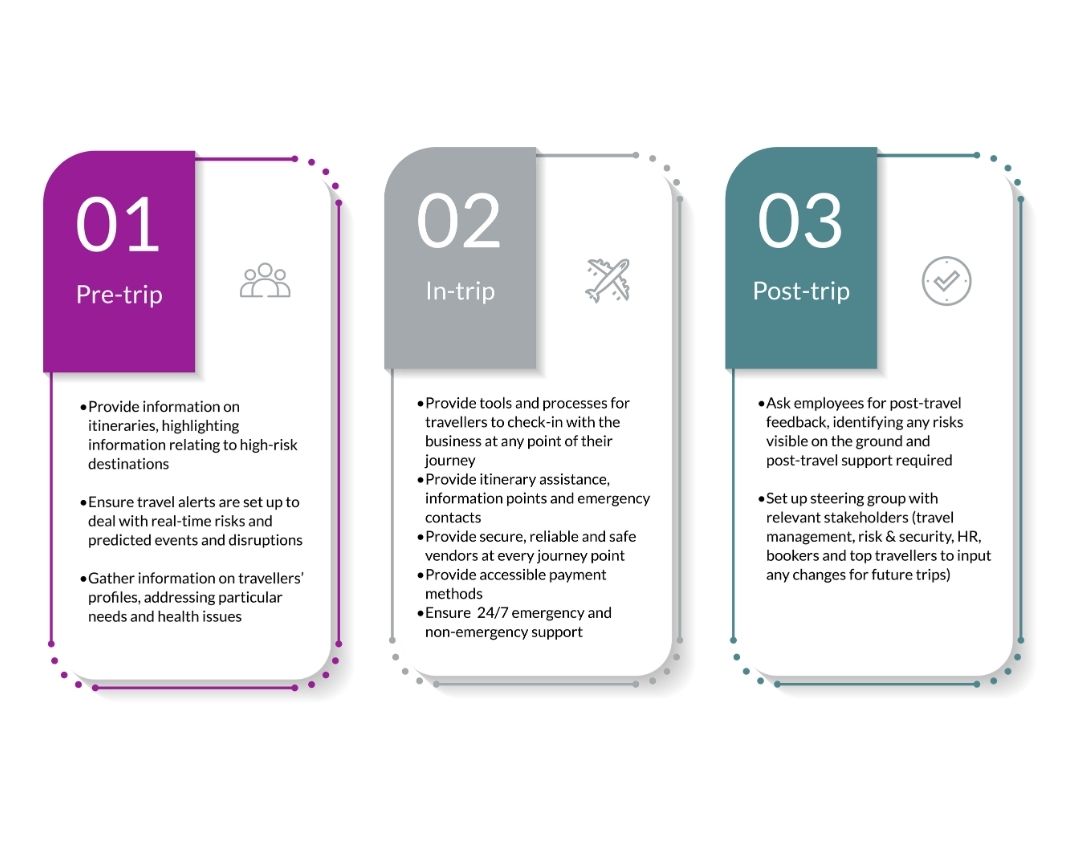If the events of the last two years have highlighted anything to the travel industry, it’s how important it is to be prepared for external risks. Risks from travel restrictions to natural disasters that could impact organisations and their employee safety while travelling on business.
Business travel risks are wide-ranging. Risk prevention needs to be put in place from health and safety risks to personnel issues. Failure to have a plan in place to confront these risks could have serious knock-on effects for business. This could lead to litigation and a challenge on a business’ professional reputation.
As a Duty of Care to their employees, organisations are looking for ways that allow them to protect their workers when travelling on business trips and in the event of an emergency while they’re away. They also want to show that any decisions they take, related to risk, are based on robust and reliable information.
How do you do that? Make sure your travel risk management programme has assessments in place that meet the standards of the ISO 31030 Travel Risk Management Standards.
What is the ISO 31030 Travel Risk Management standard?
The International Standardisation Organisation (ISO) published the ISO 31000 Risk Management Standards four years ago. This particular standard was created so that businesses could plan ahead and mitigate for everyday risks.
Last year it went a step further to incorporate Business Travel Standards – the ISO 31030.
Businesses can implement these standards into their strategies to obtain ISO 31030 certification. These will look at risk profiles such as organisational resilience, IT, corporate governance and HR. They’ll also look at health, safety and security, crisis management and business continuity.
The standard sets out a structured approach to develop, apply, evaluate and review travel risk management policies and programmes. It then assesses what the travel risks might be.
All aspects of business travel are covered, ranging from authorisations, planning, policy and traveller assessment to transportation, destination and accommodation. It also means travel managers across international businesses can go from being unprepared for risk situations to having a well-thought-out, critical travel risk management strategy.
How does the standard affect business travel programmes?
Following this standard means businesses can work towards a universal standard of travel risk assessment. It also means they avoid only identifying risks relevant to just their own travel programmes. For example, is travel appropriate for security, safety or health reasons? And, the business will be accountable towards this universal standard.
A travel policy needs to be carefully co-ordinated, whether your employees travel frequently, long haul or just take a single domestic trip. Every trip is different and will therefore generate different challenges and security risks.
If something happens unexpectedly, the organisation must provide reliable, immediate 24/7 emergency service for their travellers, wherever they are in the world.
Travel risk management solutions
- Pinpoint the definite risks in the parts of the world your travellers are visiting, as well as across all parts of the journey.
- Consider what the potential risks could be and whether certain events in the destination may affect safety.
- Consider how you could prevent, minimise and mitigate those risks.
- Share these anticipated risks with travellers and what steps you have in place to mitigate them. What can travellers be doing to protect themselves too, in terms of security and safety?
- Provide travellers with guidance on how to adequately respond to risk. Give them details for medical or emergency response. Provide details on accessible services and assistance information.
- Provide your travellers with assistance in case any incidents occur and put in place ways for their safe return.
- Ask for post-travel feedback, from which you can report and evaluate.
INTERESTED IN FINDING OUT MORE?
For further information, email [email protected] or contact your Client Success Manager to discover more ways Reed & Mackay can transform the way your business travels.




